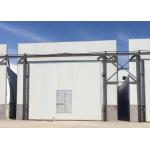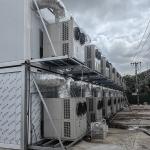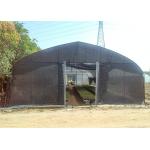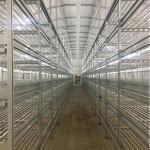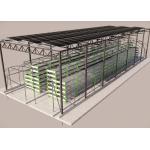Introduction of Mushroom growing container
The intelligent ecological mushroom shelter is a multifunctional
and movable cultivation device that can automatically control
environmental factors such as temperature, humidity, carbon
dioxide, and light. Its main body is constructed with a steel
structure frame + polyurethane sandwich panels.
Features
I.High controllability of the environment
Temperature regulation: Mushroom growing container can effectively control the internal
temperature. With the use of thermal insulation materials, heat
loss can be minimized in cold weather, maintaining a relatively
warm environment.
Humidity regulation: Mushroom growth typically demands a relatively high-humidity
environment. The humidity control system equipped in the container
can precisely adjust the humidity.
Light regulation: Although mushrooms do not require as intense light as green plants
for growth, appropriate light conditions are still
beneficial.
Gas concentration regulation: The respiration process and growth of mushrooms will affect the
gas composition inside the greenhouse. The ventilation system can
adjust the concentrations of carbon dioxide and oxygen. For
example, during the mycelium growth stage of mushrooms, an
appropriate amount of carbon dioxide can promote mycelium growth.
During the fruiting body formation stage, properly reducing the
carbon dioxide concentration and increasing the oxygen
concentration are conducive to the formation and development of
mushrooms.
II.Increased yield and quality
Stable growth conditions boost growth: Since the growing container can provide relatively stable
temperature, humidity, light, and gas environments, mushrooms can
grow under optimal conditions. Such a stable environment reduces
the interference of adverse external factors (such as sudden
temperature changes, drought, and heavy rain), making the mushroom
growth cycle more regular and accelerating the growth rate. For
example, under suitable conditions, the growth cycle of oyster
mushrooms can be shortened, and the fruiting can be more uniform.
The yield can be 30% - 50% higher compared to open-field
cultivation.
Reduced risk of pest and disease infestation: The good sealing and protective properties of the greenhouse can
effectively block external pests and pathogens. Compared with
open-field cultivation, the probability of mushrooms being infected
by pests and diseases in the container is relatively low.
III.Extended cultivation seasons
Advantages of off-season cultivation: Mushroom growing container break the limitations of natural
climates, enabling growers to cultivate mushrooms in
non-traditional seasons. In cold winters or hot summers, as long as
the environmental conditions inside the container are well
regulated, fresh mushrooms can be grown. For example, in the
northern winter, cold-resistant varieties such as enoki mushrooms
can be planted using the insulation facilities of the greenhouse to
meet the market demand for mushrooms during the off-season and
achieve better economic benefits.
Year-round production: By reasonably arranging the planting time of different mushroom
varieties and adjusting the greenhouse environment, growers can
achieve uninterrupted mushroom production throughout the year.
Different mushroom varieties have different requirements for
environmental conditions. Selecting suitable varieties for planting
in different seasons can fully utilize the facilities of the
container, improving the utilization rate and output efficiency of
the greenhouse.
IV.High land use efficiency
Multi-layer planting design: Multiple layers of cultivation racks can be installed inside the
container, making full use of vertical space. This multi-layer
planting method can produce more mushrooms per unit area of land.
For example, in a container with three layers of cultivation racks,
the mushroom yield can be 2 - 3 times that of single-layer planting
on flat ground. The design of the cultivation racks can be adjusted
according to the growth characteristics and management requirements
of mushroom varieties for the convenience of growers' operation and
harvesting.
Flexible layout: The shape and internal layout of the container can be
flexibly designed according to the land shape and planting plan.
Technical Specifications
Equipment name | Specifications |
PLC Control System | LCD Screen Size | 7 inches |
| Power Supply | 380V 50Hz |
| High-Voltage Control Box | 500*700mm |
Temperature Control System | Cooling Capacity | 20Kw |
| Power | 5.5kw |
| Heating Capacity | 22Kw |
| Power | 5.8kw |
| Frequency Conversion Fan | 1.5Kw, Air Volume 6000m³/h Including Fresh Air, Exhaust Air, and Return Air |
| Temperature Control Range | 10 - 30℃ |
| Temperature Sensor | Measurement Range: -40—80℃ Accuracy: ±0.1℃ |
| Outdoor Unit Duct Insulation | 25mm thick anti-freezing, anti-condensation, and heat-insulating
cotton |
Humidification System | Humidification Method | Ultrasonic Atomization 220V/50Hz |
| Humidification Capacity | 10Kg/h 700W 110mm |
| Humidity Control Range | 50 - 99%RH |
| Humidity Sensor | Measurement Range: 0 - 100%RH, Accuracy: ±1% |
| PVC Pipe | Φ110mm, perforated |
Lighting System | LED Light Strip | Illumination White Light 220V |
| LED Light Strip | Light Compensation Blue Light 220V |
Cultivation Rack | Low-Carbon Steel Wire Plastic-Immersed Grid Rack | Size: 7000*2000*100mm, 2 racks; 6000*2000*100mm, 2 racks; Each room can hold about 1500 mushroom bags. |
FAQ:
Q: Are you a factory or a trading company?
A: We are a manufacturer with a factory covering an area of 2,000
square meters and various production equipments.
Q: What is the material of the main structure of your greenhouse?
How long can it be guaranteed to be used?
A: The main frame of our greenhouse is generally made of hot-dip
galvanized steel. This material has super corrosion resistance.
Under normal circumstances, with proper daily maintenance, its
service life can reach 15 - 20 years. It can resist common natural
disasters such as wind, rain, and snow pressure, providing a stable
growing environment for the crops in the greenhouse.
Q: Before placing a large order, we'd like to buy a sample
greenhouse to try it out first. Is that possible?
A: Yes. We can send you a small-scale greenhouse by LCL (Less than
Container Load) sea shipping.
Q: I have a piece of land and I want to grow some vegetables or
raise some fish, but I don't know what kind of greenhouse and what
size I need. Can you help me with the design?
A: Of course. You can tell us the size of your land, your expected
annual output of vegetables or fish, as well as the local climate
information. Based on these data, we can design the style, size and
price of the greenhouse for you. We'll also let you know
approximately how many workers are needed and how long it will take
to complete the installation, and how much yield you can expect in
a year.
Q: Do you provide planting technical guidance after I purchase the
greenhouse?
A: We have a professional planting technology team. After you
purchase the greenhouse, according to the crop varieties you plant,
we will customize a detailed planting plan for you, covering all
aspects such as sowing time, planting density, fertilization and
watering frequency, and key points of pest and disease prevention
and control. During the planting process, you can contact our
technicians via phone, video, etc. at any time, and they will
answer your questions promptly.
Q: How long will it take to receive the greenhouse after placing an
order?
A: Generally, for standard-specification greenhouses, production,
transportation, installation and commissioning can be completed
within 20 - 30 days after you place the order and the deposit
arrives. However, if you customize special specifications or
configurations, or the quantity you purchase is relatively large,
it may take about 40 - 60 days. We will give you an accurate time
estimate when signing the contract.
Q: What kind of assistance can you provide during the greenhouse
installation?
A: We will provide several ways to help you with the installation:
First, we'll provide written installation instructions; second,
we'll offer online installation guidance; third, we'll dispatch
engineers to your construction site for on-site installation
guidance; fourth, if there is our local agent, our agent can also
help you with the installation service.
Q: What are the quick solutions when encountering pest and disease
problems?
A: First, our technical team will help you accurately identify the
types of pests and diseases, which is the key to taking the right
countermeasures. Then, according to different pests and diseases,
we will provide corresponding biological control, physical control
or chemical control solutions. For example, for common pests like
aphids, we recommend using physical control methods such as yellow
sticky traps combined with biological control methods like
releasing ladybugs, so as to minimize the use of chemical
pesticides, which can protect the environment while effectively
controlling pests and diseases.
Q: What preparations should I make before installation?
A: First, obtain the building permit from the government if
required. Second, prepare the tools according to the tool list we
send you. Third, get the workers ready. Fourth, prepare the power
supply if needed. Fifth, prepare a place to store the goods upon
arrival to keep them from getting wet in the rain.
Q: What does your greenhouse after-sales service include?
A: We provide a one-year free warranty service. During the warranty
period, for any parts of the greenhouse with non-artificial damage
or quality problems caused by natural disasters, we will replace or
repair them for free. After one year, we still offer long-term paid
maintenance services.
